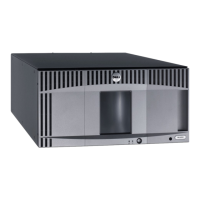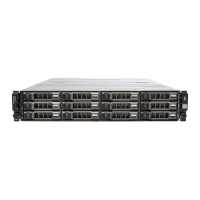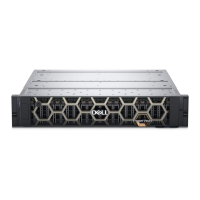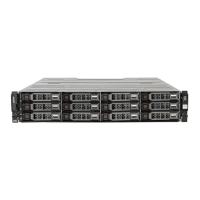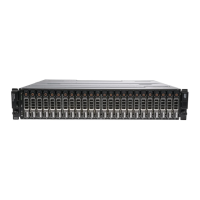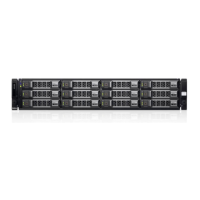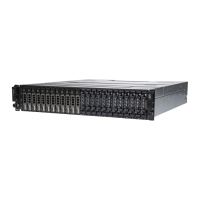PowerVault ML6000 Maintenance Guide 133
a. From the operator panel or Web client, select Setup > I/O Blades > FC I/O Blade Control and
enable host mapping.
b. From the operator panel or Web client, select Setup > I/O Blades > Host Mapping.
12 Configure host port failover on the FC I/O blade (optional). From the Web client, select Setup > I/O
Blades > Host Port Failover. To enable host port failover, you must configure target ports 1 and 2 on
the I/O blade as point-to-point connections (Setup > I/O Blades > Port Configuration). See the User’s
Guide for complete instructions.
13 Save the library configuration (from the Web client, select Tools > Save/Restore Configuration).
Control Paths and FC I/O Blades
A control path is the connection between a partition and host application. The control path connection is
made through a designated tape drive or through a Fibre Channel (FC) I/O blade.
Only one tape drive can be selected as the control path per partition. In the event that the tape drive control
path connection to the host application fails, you can manually select a different control path tape drive for
the partition.
If I/O blades are installed in the library, you can configure host port failover.
When you create a partition, the library automatically assigns control paths. The following table describes
how the library assigns control paths, and what you need to know if you want to change the control path.
You can change the control path tape drive at any time by selecting Setup > Control Path from either the
operator panel or the Web client.
If the library
contains:
And the partition
contains:
Then the default
control path for
the partition is:
If you want to change the control
path, note the following:
No FC I/O
blades
Any combination of
tape drive types
(FC, SAS, or SCSI)
The first tape drive
assigned to the
partition
You must select a tape drive as the
control path.
One or more
FC I/O blades
At least one FC
tape drive
The FC I/O blade
It is recommended that you allow the
FC I/O blade to be the control path for
the partition.
Using the FC I/O blade as the control
path allows you to use the LUN
mapping and host port failover
features.
You may select a tape drive as the
control path if the tape drive is not
connected to an I/O blade.
One or more
FC I/O blades
No FC tape drives The first tape drive
assigned to the
partition
You must select a tape drive as the
control path.
Do not select an FC tape drive as control path if it is connected to an
FC I/O blade. The control path will be filtered out by the I/O blade and
will not be visible to the host.
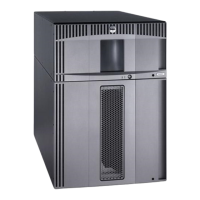
